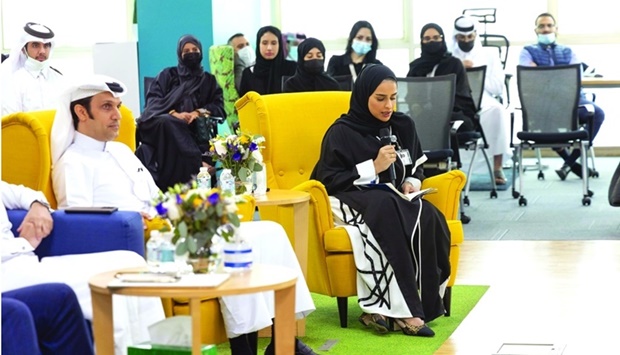The Communications Regulatory Authority (CRA) and Mada -- Qatar Assistive Technology Center launched the Accessible Telecommunications International Best Practices report, during a seminar attended by officials from both organisations and representatives of the Ministry of Communications and Information Technology (MCIT), Ooredoo Qatar and Vodafone Qatar.
The report was developed with the aim of informing stakeholders about the international best practices in the field of accessible telecommunications, in addition to the latest systems, technologies, equipment, tools, software, and services that help improve the accessibility to telecommunications services and applications by users with physical, visual, speech, and hearing disabilities and the elderly users.
Additionally, the report includes a plan and future recommendations directed to all stakeholders, including the main players in the Information and Communications Technology (ICT) sector, and concerned parties and organisations, to achieve further progress towards inclusive access to telecommunications. Within the framework of the strategic partnership between the CRA and Mada, work was carried out for two years according to a methodology based on research and study of the international best practices in the field of accessible telecommunications. The policies and services provided to persons with disabilities and the elderly were evaluated and discussed with stakeholders and service providers.
On this occasion, engineer Salma al-Sulaiti, Standards and Next Generation Technology section head, CRA said: “The importance of this report lies in the fact that it contributes to raising stakeholders’ awareness about the best practices followed in the field of accessible telecommunications, where through their adoption, they contribute to ensuring the accessibility of users with disabilities and the elderly on an equal basis with others, especially since ICT is a major part of our modern-day interactions and activities in various fields; education, health, environment, or others. It also contributes greatly to driving development and diversifying the Qatari economy; one of Qatar National Vision 2030 goals.”
Amani al-Tamimi, ICT Access Programs and Services manager at Mada, said: "The report contributes to ensuring inclusive access to telecommunications, by introducing stakeholders to ways of empowering users who are persons with disabilities or the elderly to access telecommunications services and applications, thus facilitating their effective involvement in learning, building capacity, development, and innovation. In addition to integrating them more in the society and the labor market, which contributes to improving the quality of life and achieving development in the various pillars of Qatar National Vision 2030.”
The report was developed with the aim of informing stakeholders about the international best practices in the field of accessible telecommunications, in addition to the latest systems, technologies, equipment, tools, software, and services that help improve the accessibility to telecommunications services and applications by users with physical, visual, speech, and hearing disabilities and the elderly users.
Additionally, the report includes a plan and future recommendations directed to all stakeholders, including the main players in the Information and Communications Technology (ICT) sector, and concerned parties and organisations, to achieve further progress towards inclusive access to telecommunications. Within the framework of the strategic partnership between the CRA and Mada, work was carried out for two years according to a methodology based on research and study of the international best practices in the field of accessible telecommunications. The policies and services provided to persons with disabilities and the elderly were evaluated and discussed with stakeholders and service providers.
On this occasion, engineer Salma al-Sulaiti, Standards and Next Generation Technology section head, CRA said: “The importance of this report lies in the fact that it contributes to raising stakeholders’ awareness about the best practices followed in the field of accessible telecommunications, where through their adoption, they contribute to ensuring the accessibility of users with disabilities and the elderly on an equal basis with others, especially since ICT is a major part of our modern-day interactions and activities in various fields; education, health, environment, or others. It also contributes greatly to driving development and diversifying the Qatari economy; one of Qatar National Vision 2030 goals.”
Amani al-Tamimi, ICT Access Programs and Services manager at Mada, said: "The report contributes to ensuring inclusive access to telecommunications, by introducing stakeholders to ways of empowering users who are persons with disabilities or the elderly to access telecommunications services and applications, thus facilitating their effective involvement in learning, building capacity, development, and innovation. In addition to integrating them more in the society and the labor market, which contributes to improving the quality of life and achieving development in the various pillars of Qatar National Vision 2030.”

